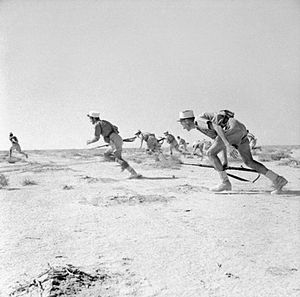Battle of Bir Hakeim
| Battle of Bir Hakeim | |||||||
|---|---|---|---|---|---|---|---|
| Part of the Battle of Gazala | |||||||
 Free French Foreign Legionnaires assaulting an enemy strong point at Bir Hakeim |
|||||||
|
|||||||
| Belligerents | |||||||
|
|
|
||||||
| Commanders and leaders | |||||||
|
|
|
||||||
| Strength | |||||||
| 3,703 men | 37,000 Axis troops | ||||||
| Casualties and losses | |||||||
| 141 killed 229 wounded 814 captured 53 guns 50 vehicles 110 aircraft |
3,300 killed or wounded 227–845 captured 164 vehicles 49 aircraft |
||||||
| Bir Hakeim was attacked by the Ariete Division, then by mixed force of the Trieste and 90th Light divisions | |||||||
The Battle of Bir Hakeim (Arabic pronunciation: [biʔr ħaˈkiːm]) took place at Bir Hakeim, an oasis in the Libyan desert south and west of Tobruk, during the Battle of Gazala (26 May – 21 June 1942). The 1st Free French Brigade (Général de brigade Marie Pierre Kœnig) defended the position from 26 May – 11 June against much larger Axis forces of Panzerarmee Afrika (Generaloberst Erwin Rommel). The Panzerarmee captured Tobruk ten days later but the delay imposed on the Axis offensive by the defence of the fortress influenced the cancellation of Operation Herkules, the plan for an Axis invasion of Malta. Rommel continued to advance and invaded Egypt, slowed by British delaying actions until the First Battle of El Alamein in July, where the Axis advance was stopped. Both sides used the battle for propaganda, Winston Churchill renamed the Free French as the Fighting French and Hitler called the French the second best fighters after the Germans.
At the beginning of 1942, after its defeat in western Cyrenaica during Unternehmen Theseus, the Eighth Army (Lieutenant-General Neil Ritchie) faced the Axis troops in Libya roughly 48 kilometres (30 mi) west of the port of Tobruk, along a line running from the coast at Gazala, southwards for about 48 kilometres (30 mi). Both sides accumulated supplies for an offensive to forestall their opponent and General Claude Auchinleck, Commander in Chief of Middle East Command, hoped for the Eighth Army to be ready by May. British code-breakers tracked the dispatch of convoys to Libya as the British anti-shipping offensive from Malta was neutralised by Axis bombing and forecast that the Axis would attack first.
...
Wikipedia
